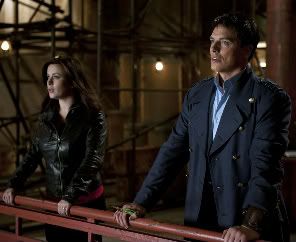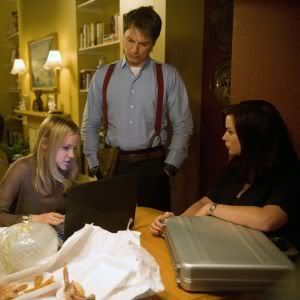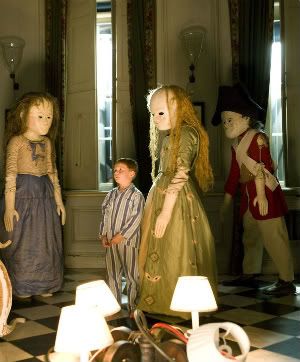Doctor Who: Day of the Daleks (Special Edition DVD)

Doctor Who: Season 9 - Day of the Daleks
Written by Louis Marks
Directed by Paul Bernard
Broadcast on BBC1 - 1st - 22nd January 1972
DVD release - 12 September 2011
This review is based on the UK Region 2 DVD release.
This DVD release is timely, given the direction that the show has taken of late. Back in 1972 it possibly seemed daring for a TV series about time travel to broadcast a story focused on, well, time travel, but these days temporal paradoxes are ten-a-penny in Doctor Who. Day of the Daleks did it with seventies' panache, though, and its episode four exposition – as the Doctor realises what's happened, or will happen – still packs a decent punch. But Day's appearance on DVD is timely for a number of other reasons too. It's difficult to hear Jo Grant talking about “September the 13th” – a key date in the story – without hearing strange echoes of our own “September 11th” and its recent anniversary. At the same time, the story's release was surely deliberately scheduled for September 12th in the UK, allowing those who pre-ordered or snapped up a copy quickly to watch Day of the Daleks again on the most appropriate of days. Whether it's historical contingency changing the associations viewers now bring to a Jon Pertwee story, or playful use of 2Entertain's schedule, this release is all about time. It includes a useful “Now and Then” feature (particularly pertinent since new footage for the Special Edition involved returning to Dropmore Park), as well as Part Two of “The UNIT Family”. And the reworked Day of the Daleks gets its own separate making-of on Disc Two. The commentary track includes Terrance Dicks and Barry Letts, with contributions from actors Jimmy Winston and Anna Barry as well as vision mixer Mike Catherwood, who also participates in “A View from the Gallery”. All of this provides a good mix of front-of-camera and behind-the-scenes anecdotes, with features from Blue Peterand Nationwide further contributing to the package, though neither seems to represent the Daleks especially well.
Among all these extras, Disc One's “Blasting the Past” includes some interesting observations from the likes of Terrance Dicks – unimpressed by the Doctor casually shooting an Ogron – and assorted commentators bemoaning the 'three Dalek problem' of the story, with director Paul Bernard coming in for a fair amount of criticism. This lack of Daleks becomes one of the key narratives told about Day, production and fan lore which positions the story as weak in credibility. However, viewed after the events of 2005's Dalek (seemingly referred to by Anna Barry in the commentary) is this really such an issue? Why shouldn't the Daleks send a taskforce of three to sort out the Earth's timeline? It could be argued that rather than making their military mission look under-powered, this reinforces the Daleks' potency. But fandom's favoured interpretation – three Daleks bad – finds itself given succour by this DVD. It's unsurprising, really, because fan interpretations essentially inform all the changes made in Disc Two's main event: the reshaped Special Edition.
Fandom seems agreed on the 'fact' that Day's Dalek voices are a bit rubbish. Early on, they're slow and ve-ry, ve-ry ob-vi-ous-ly syllabic, but that reinforces the Daleks' alien nature. Hearing the original voices again, they don't sound quite as shockingly dreadful to my ears as the DVD Extras and Making-ofs want to assure me is the case. Although Nick Briggs' new vocal performance is as polished and Dalek-y as you could ever wish it to be, I'm still not wholly convinced by the desire to iron out Doctor Who's rough edges or story-by-story inconsistencies. As “Blasting the Past” points out, sometimes you just can't make everything fit together. (And additional Disc Two extra, “The UNIT Dating Conundrum”, makes much the same point). Ben Aaronovitch's sage words on the subject of overall continuity run as follows:
Call this the Aaronovitch Limitation Effect, if you like: it basically says that we should just learn to live with Doctor Who's inconsistencies of detail rather than trying to make everything meet up in perfect continuity. But if we can't ever consistently track the Doctor's attitude to drinking, or UNIT dating, then why aim for consistency in Dalek voices so that they 'fit' with other portrayals? Equally, why worry about whether there are three Daleks if it can be argued that just one is enough to cause a right old ruckus? (Sadly Rob Shearman isn't called upon as a talking head in this instance, so I had to imagine my own extra-special edition where he contests the view that three Daleks can't make a convincing attack force).
One Special Edition change directly corrects what members of the production team have bemoaned as a “mistake”. So the gun-toting, Ogron-blasting Doctor criticised by Terrance Dicks and Barry Letts is deftly revised. Now we see the offending Ogron shoot first, with the Doctor acting in self defence. By contrast, other tweaks strike me as more questionable, or as matters of fan taste: why alter the images of past Doctors which in the original are accompanied by elements of the Doctor Who closing title sequence, so that now the new images have a more generic visual backdrop? The title sequence appearing in-story is an interesting detail: seeing visuals which usually frame Doctor Who bleeding into the narrative folds the show strikingly in on itself. Altering this bizarre moment seems tantamount to trying to smooth out and unfold the text; a bit of a shame when the original has a notable, quirky charm.
More understandably, other changes are aimed at beefing up the SF and action-adventure credentials of the story, so that now we see characters disintegrate rather than simply disappear; the Doctor's trike exploits have been visually souped up and the Controller's death sequence is rendered even more dramatic, as are various battle sequences. These additions generally work well, unlike the newly designed 22nd century panorama which looks too much like dropped-in CGI for my tastes, and is markedly out of keeping with the production values and visuals surrounding it.
One of Disc Two's extras “The Cheating Memory” is a discussion of how memory works, but it also amounts to a statement about the story's reconstruction by producer Steve Broster, since it contrasts footage from the two versions of Day of the Daleks, one dubbed 'Memory' and the other 'Reality'. The 'Memory' version is actually the Special Edition: the suggestion is that Broster has finally produced his remembered version of Day – more spectacular than it actually was in 1972. Memory hasn't cheated here, though. Instead, one fan's childhood memories have inspired a re-ordering of reality, i.e. a reworking of the story.
But I don't think memory is the crucial term in all of this. After all, this Special Edition isn't really about one fan's memory – it's a team effort drawing on the skills, the craft, and the artistry of people such as Mark Ayres, Nick Briggs, Toby Chamberlain, John Kelly and others. As such, the two Dalek Days shouldn't be captioned 'Memory' and 'Reality'; they should be thought of as 'Community' versus 'Reality', because it's the fan community and its priorities that are testified to here rather than Broster's own personal recollections. It's effectively the fan community – or at least one generation of fans – which has determined how Day should be fixed and enhanced. It's fandom that's driven this agenda, working against the Aaronovitch Limitation Effect to make Dalek extermination effects more like they 'should be', along with voices, and visions of the 22nd century.
Day of the Daleks: Special Edition is thus almost a sort of anti-Star Wars release. Where that franchise has a creator and rights-owner who keeps on 'fixing' (that is, messing with) details that its fan community feels are sacred, in Doctor Who's case it's the fan community that's able to fix details it has identified, over the years, as being problematic. The Day of the Daleks: Special Edition is quite clearly a labour of fan love, and deserves to be appreciated in that spirit. But I think it should also be remembered that fan communities have a habit of revising their collective views over time: what seem like 'facts' about Day's failings may well be revised again in the future. Rather than simply capturing a childhood memory, then, or representing an objective take on Day, the Special Edition showcases fandom's creativity and professionalism whilst offering a snapshot of communal, generational interpretations of the original story. While there may be no perfect Day to be had, both versions on this DVD are vibrant reminders of how iconic Doctor Who can be of its time: then, and now.




 As we reach the end of the ten-episode epic the resolution of the titular central plot-line is probably obvious to everybody, but as one might expect from the twists and turns of previous Torchwood storylines the journey to that resolution and emotional angst encountered along the way is never going to be so simple.
As we reach the end of the ten-episode epic the resolution of the titular central plot-line is probably obvious to everybody, but as one might expect from the twists and turns of previous Torchwood storylines the journey to that resolution and emotional angst encountered along the way is never going to be so simple.







